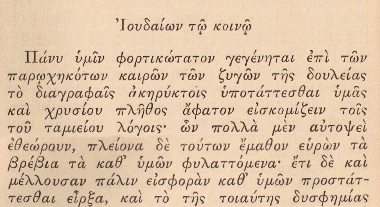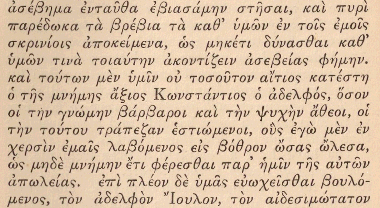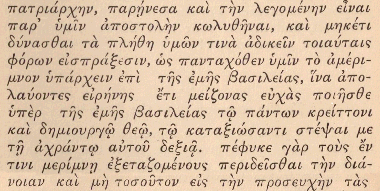THE WORKS OF THE EMPEROR JULIAN, edit. and trans. by
Wilmer Cave Wright, Loeb Classical Library, vol. III, 1923.
Letter 51 (Epistle 25)





To the community of the Jews.
In times past, by far the most burdensome thing in the yoke of your slavery has been the fact that you were subjected to unauthorised ordinances and had to contribute an untold amount of money to the accounts of the treasury. Of this I used to see many instances with my own eyes, and I have learned of more, by finding the records which are preserved against you. Moreover, when a tax was about to be levied on you again I prevented it, and compelled the impiety of such obloquy to cease here; and I threw into the fire the records against you that were stored in my desks; so that it is no longer possible for anyone to aim at you such a reproach of impiety. My brother Constantius of honored memory was not so much responsible for these wrongs of yours as were the men who used to frequent his table, barbarians in mind, godless in soul. These I seized with my own hands and put them to death by thrusting them into the pit, that not even any memory of their destruction might still linger amongst us. And since I wish that you should prosper yet more, I have admonished my brother Iules, your most venerable patriarch, that the levy [αποστολη] which is said to exist among you should be prohibited, and that no one is any longer to have the power to oppress the masses of your people by such exactions; so that everywhere, during my reign, you may have security of mind, and in the enjoyment of peace may offer more fervid prayers for my reign to the Most High God, the Creator, who has deigned to crown me with his own immaculate right hand. For it is natural that men who are distracted by any anxiety should be hampered in spirit, and should not have so much confidence in raising their hands to pray; but that those who are in all respects free from care should rejoice with their whole hearts and offer their suppliant prayers on behalf of my imperial office to Mighty God, even to him who is able to direct my reign to the noblest ends, according to my purpose. This you ought to do, in order that, when I have successfully concluded the war with Persia, I may rebuild by my own efforts the sacred city of Jerusalem, which for so many years you have longed to see inhabited, and may bring settlers there, and, together with you, may glorify the Most High God therein.
In times past, by far the most burdensome thing in the yoke of your slavery has been the fact that you were subjected to unauthorised ordinances and had to contribute an untold amount of money to the accounts of the treasury. Of this I used to see many instances with my own eyes, and I have learned of more, by finding the records which are preserved against you. Moreover, when a tax was about to be levied on you again I prevented it, and compelled the impiety of such obloquy to cease here; and I threw into the fire the records against you that were stored in my desks; so that it is no longer possible for anyone to aim at you such a reproach of impiety. My brother Constantius of honored memory was not so much responsible for these wrongs of yours as were the men who used to frequent his table, barbarians in mind, godless in soul. These I seized with my own hands and put them to death by thrusting them into the pit, that not even any memory of their destruction might still linger amongst us. And since I wish that you should prosper yet more, I have admonished my brother Iules, your most venerable patriarch, that the levy [αποστολη] which is said to exist among you should be prohibited, and that no one is any longer to have the power to oppress the masses of your people by such exactions; so that everywhere, during my reign, you may have security of mind, and in the enjoyment of peace may offer more fervid prayers for my reign to the Most High God, the Creator, who has deigned to crown me with his own immaculate right hand. For it is natural that men who are distracted by any anxiety should be hampered in spirit, and should not have so much confidence in raising their hands to pray; but that those who are in all respects free from care should rejoice with their whole hearts and offer their suppliant prayers on behalf of my imperial office to Mighty God, even to him who is able to direct my reign to the noblest ends, according to my purpose. This you ought to do, in order that, when I have successfully concluded the war with Persia, I may rebuild by my own efforts the sacred city of Jerusalem, which for so many years you have longed to see inhabited, and may bring settlers there, and, together with you, may glorify the Most High God therein.
Notes.
Julian here refers to the Jewish Patriarch Hillel II (by his Hellenized name) as "my brother Jules" to suggest a common religious and political cause.
After the total destruction by Hadrian, Jews had been forbidden to live in Jerusalem (on pain of death), to which Julian here refers. The reference to rebuilding Jerusalem means rebuilding the ancient Temple and reinstituting Jewish worship there, for previous emperors had already rebuilt the city, and Constantine had built many Christian buildings and had made Jerusalem a Christian city.
Emperor Julian was killed in this Persian campaign the following year, in 363 C.E., and the restoration he had begun was then terminated.
— A.v.d.N.
This letter has different numerical designations in different editions.
Julian here refers to the Jewish Patriarch Hillel II (by his Hellenized name) as "my brother Jules" to suggest a common religious and political cause.
After the total destruction by Hadrian, Jews had been forbidden to live in Jerusalem (on pain of death), to which Julian here refers. The reference to rebuilding Jerusalem means rebuilding the ancient Temple and reinstituting Jewish worship there, for previous emperors had already rebuilt the city, and Constantine had built many Christian buildings and had made Jerusalem a Christian city.
Emperor Julian was killed in this Persian campaign the following year, in 363 C.E., and the restoration he had begun was then terminated.
— A.v.d.N.